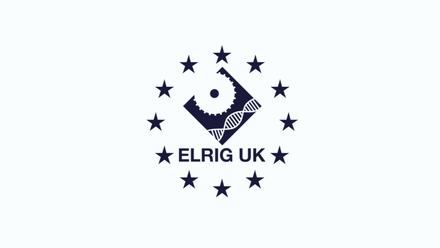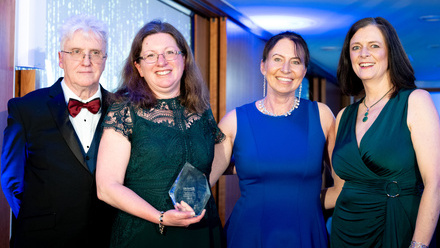Shaping future leaders in biomanufacturing: insights from MAC LeaP

By analysing behavioural profiles and consulting with industry experts, we can better understand the evolving demands of leadership in bioscience. These findings not only highlight the importance of nurturing new talent but also emphasise the need for adaptive, people-oriented leadership to navigate the ever-changing landscape of our industry.
1. BIA Manufacturing Advisory Committee Leadership Programme (MAC LeaP)
From 2017 - 2023 I have run workshops with the BIA MAC LeaP community, an innovative programme that aims to nurture the next generation of leaders in biopharmaceutical medicines manufacturing. The workshops focussed on helping participants reflect on and define their career opportunities.
The 99 participants, hailing from a diverse range of large and small companies, have an average of 10 years of experience and are involved in research, development, and manufacturing (75%), commercial (19%), and academic (6%) roles, with an equal gender split. A component of the workshops used Thomas International’s Personal Profile Analysis (PPA) to measure strengths and preferred behavioural styles, revealing no significant difference between male and female participants.
2. Biotechnology sector
In parallel, I have also conducted PPA profiling for around 638 individuals in the UK biotechnology sector, including the 99 LeaP participants. This group comprises 150 postdoctoral professionals, 100 PhD students, and 400 individuals from various roles and levels within biotechnology SMEs. Among the SME professionals, over 100 are early in their careers, meaning that more than 50% of the total 638 profiled individuals are at the early stages of their careers.
3. ‘Early and Mid-Career Professionals and Next Generation Leaders’ Consultation
In Autumn 2023, Biosocius conducted a consultation to identify the key career enablers for early and mid-career professionals in our sector. Approximately 150 participants contributed around 300 ideas before and during the event, and the results were presented live at the BIA 20th annual bioProcessUK conference in November 2023.
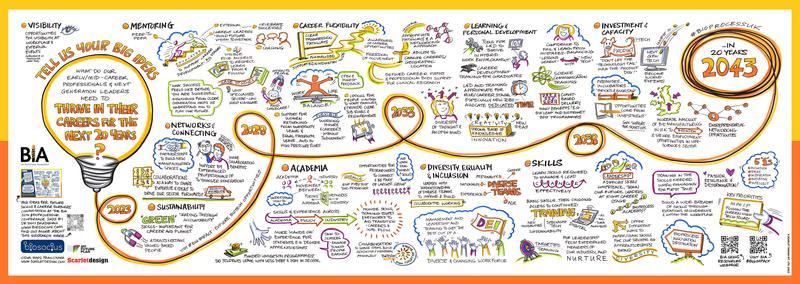
MAC LeaP vs sector insights
This comprehensive data set offers a deep understanding of the behavioural preferences of individuals, teams, and companies in our sector, which I have analysed to glean insights for leadership development.
The PPA ‘DISC’ approach divides a person’s natural personality into four traits: Dominance, Influence, Steadiness and Compliance. This framework explores the interplay between these traits and can be used to enhance staff engagement, develop management strategies, and define personal training priorities.
- Dominance: Sees the big picture, accepts challenges, is sometimes blunt, gets straight to the point, and is fast-paced and sceptical.
- Influence: Places emphasis on influencing or persuading others, is open and enthusiastic, optimistic, enjoys collaborating, is sociable, fast-paced, and accepting.
- Steadiness: Values cooperation, sincerity, and dependability, is calm, and supportive, dislikes being rushed, is gentle and accommodating, moderate-paced, and accepting.
- Compliance: Prioritises quality and accuracy, expertise and competence, desires detail and enjoys independence, reasons objectively, fears being wrong, is logical, private, and analytical, moderate-paced, and sceptical.
When we compare the overall profile of the 638 data points from the biotechnology sector with the 99 data points from the MAC LeaP cohort, we see that the MAC LeaP participants are generally representative of the broader sector.
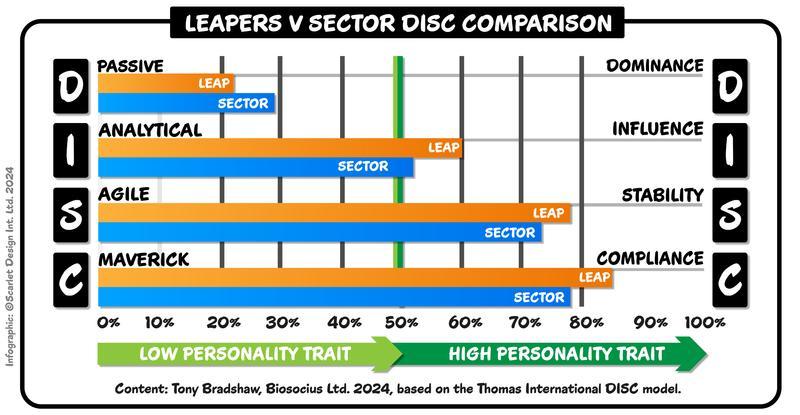
What does this mean?
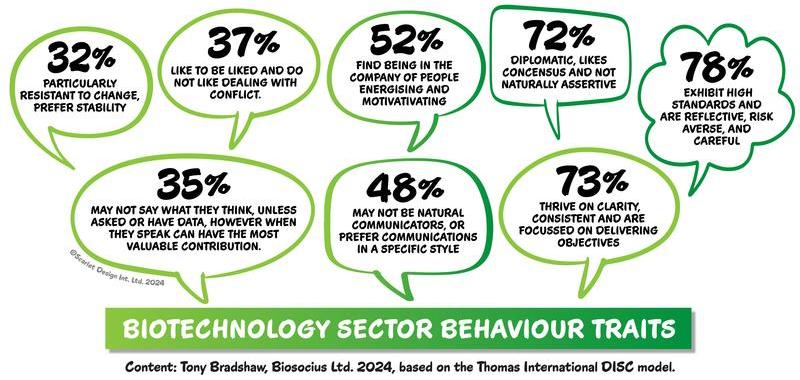
The data above highlights innate behaviours. As individuals progress in their careers, they learn to flex their intrinsic traits through experience and targeted training in areas such as conflict resolution and adapting their leadership style to different circumstances and team dynamics. However, early-career professionals often lack the experience and self-awareness needed to adapt their core ways of working. Addressing this quickly is crucial for their success and for resolving a key issue in the talent pipeline - hiring experienced individuals. Developing managerial skills in those assuming management roles for the first time is a primary area of focus.
Our sector is largely comprised of individuals who are attentive to detail and place great importance on accuracy and precision. They are generally friendly, capable of absorbing information, and adept at communicating both verbally and in writing. Given this profile, sector leaders must be effective communicators who set clearly defined objectives while fostering a supportive and nurturing culture that values diversity and collaboration. They should also be proficient in recognising when teams and individuals need assistance, whether in the workplace or in their career development.
Additionally, our sector benefits from senior leadership talent with decades of experience and the ability to adapt their innate behavioural traits. This expertise is now complemented by the LeaP cohort, which has developed multidisciplinary (cross-sector) networks, enhancing sector collaboration, innovation, and support.
The future
Having engaged closely with the participants of the MAC LeaP, it’s evident that the BIA has crafted a program that not only fosters crucial networks but also plays a pivotal role in shaping the current and future leaders essential to the medicines manufacturing sector. This initiative attracts a diverse cross-section of professionals who represent the forefront of our industry and are poised to become key leaders of the next generation if they aren't already. Their responsibility will extend to nurturing early-career professionals entering our field, a task that demands acute interpersonal skills.
The sector’s widespread issue of low communication scores highlights the challenge faced by those who are less naturally inclined towards communication or lack self-awareness. Addressing this challenge is crucial for effective teamwork and workplace cohesion. Leaders must possess the ability to develop people-oriented behaviours in their teams, fostering trust, resilience, and awareness to capitalize on career-building opportunities.
These efforts must be viewed within the context of our rapidly evolving world, where unforeseen challenges and innovations reshape our industry. Our future leaders must thrive in environments vastly different from those experienced by current leaders. Adaptability and foresight will be essential traits for navigating this dynamic landscape effectively.





